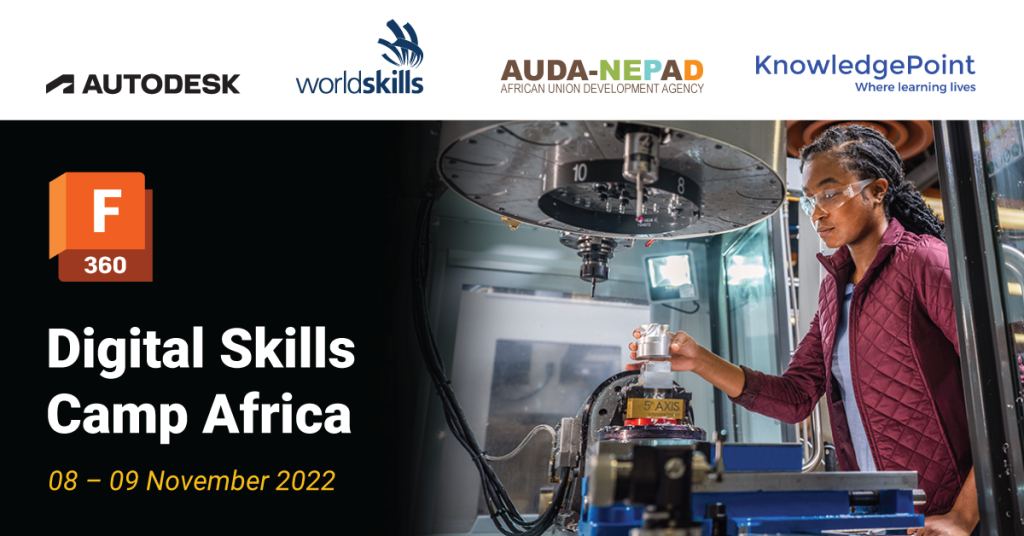
The power of digital skills was the unifying call at the Digital Skills Camp Africa, which was run on 8 – 9 November 2022.
Access the recorded presentations from the event here: https://www.youtube.com/playlist?list=PLTXEeQw3n04ZlG5rlIuUC-3lcjc4Kk3Y3
Day 1: Digital skills are today’s super power
With a focus on the importance and application of digital skills in manufacturing in Africa, participants heard from speakers including Nicolas Ouma from the African Union, Grace Lung and Dario Pinto from WorldSkills and Ryan Vessey from the PIMMS Group.
A continent-wide skills strategy and how digital skills are fundamental to building resilient futures for African youth, were front and centre. Emphasis was placed on skills systems and policies which ensure that companies and nations are able to respond to industrial challenges today and coming down the line.
The importance of keeping up to date with the latest technologies and preparing the workforce of the future to apply these technologies were key messages from WorldSkills. Participants learned more about the organisation’s global role in developing skills excellence and excellence through capacity building and competitions – in particular what it is like to be involved in the mechanical engineering competition.
Participants also heard from industry experts including Kithinji Muriungi, IEEE – Advancing Technology for Humanity, and Samia Chelbi, NET-INFO. Showcasing practical applications of digital technologies, they highlighted the need for collaboration and on bridging gaps between manufacturing disciplines.
In the afternoon sessions, participants benefited from training on Fusion 360, applying the technology to a drone modelling project. They learned how the technology is used in practice, with hints and tips on how it can be built into university curricula.
This session also earned participants CPD credits awarded through the SAIMechE.
Day 2: Collaborating to develop the skills that industry needs
Taking a deep dive into additive manufacturing, day two of our Digital Skills Camp Africa reinforced the importance of collaboration and teamwork when it comes to developing the skills needed to boost manufacturing productivity across Africa.
Participants also had the opportunity to develop their own skills – and get rewarded with CPD points from the South Africa Institute of Mechanical Engineering too!
The morning session took the form of best-practice sharing, with real-life examples of workflows in action and training initiatives to develop skills to support employability and excellence:
- Richard Hansen from Bolt Engineering in South Africa talked about how Fusion 360 workflows have supported business growth. With practical examples of how it has been used to solve customer problems – quickly and at relatively low cost – he explained how it can with rapid market-entry and provides a competitive edge.
- Award-winning Emre Orkun a graduate from Istanbul University, provided personal perspectives on the use of Fusion 360 in the design process – for underwater vehicles! His illuminating presentation highlighted how teamworking is the fastest path to success, and the benefit of using Fusion workflows to ensure designs comply with the laws of physics.
- Regis Ngenzi from Nziza Training Academy in Rwanda, talked about its partnership with Rwanda polytechnic colleges to develop digital skills for the manufacturing sector. Designed to support growth in manufacturing in the country, Nziza Training Academy worked with four polytechnic colleges, IPRC Kigali, IPRC Huye, IPRC Ngoma and IPRC Karongi. The program reiterates the importance of collaboration in skills development.
- Tochukwu Clinton Chukwueke from Clintonel Innovation Centre, in Nigeria, shared details of the Nigerian Genius Engineering Competition. Designed to boost engineering education, the challenge brings together Nigeria’s brightest minds in tertiary institutions to solve Nigeria’s toughest engineering and manufacturing challenges. During the competition, students use precision machinery and digital technology such as Autodesk’s Fusion 360.
- Representing the University of Johannesburg, Dr Kingsley Ukoba offered participants an informative overview of additive manufacturing (often known as 3d printing), including its history, its adoption and application. He provided examples from a range of industries, including its use in the development of engine block parts for the automotive sector.
- Event partner, WorldSkills asked one of its skills experts to round off the morning with an overview of the Additive Manufacturing Skills Competition. Making the point that the adoption of many technologies lag because of a lack of skills, Steve Taylor from the UK encouraged participants to play their part in closing the skills gap. He provided an overview of the process involved, the expectations and criteria associated with competition qualification. Remaining current was also a theme as he highlighted how skills are reviewed after each competition to make sure they remain current and relevant to industry-practice
Inspired by the morning sessions, participants in the afternoon were treated to hands-on experience of an additive manufacturing workflow. They learned how the workflows are used in practice, with hints and tips on how additive manufacturing skills can be built into university curricula. This session also earned participants CPD credits awarded through the SAIMechE.